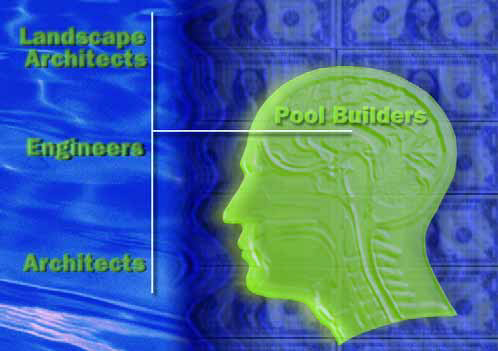Commentaries, Interviews & Profiles
It's great that more and more people in the watershaping business are interested in becoming custom designers. The way I see it, the future of the industry rests in the hands of those who strive for creativity and excellence in their work. Unfortunately, however, there are those out there who are brash enough to declare themselves "designers" without any sort of credentials to back up the claim - that is, without having done what it truly takes to
I've racked up my fair share of professional accolades and honors in the past 20-odd years. I suppose if I paid too much attention to all that stuff, I might be tempted to think that I know almost everything about my industry - but I wouldn't dream of harboring that thought, because the amount of stuff I don't know has always impressed me a lot more than the pile of stuff I do know. That simple recognition has made me hungry for knowledge and new experiences and has influenced the way I've always approached my life and my work. In fact, I shudder to think of all the things
I'd like to bring up an old observation of mine: In looking at the high-end watershapes that win awards or achieve some sort of public acclaim, it seems to me that the designs are increasingly coming from outside the mainstream pool and spa industry. This is just a strong impression, and I don't have any statistics to back up my case. But when I look around me and see who's doing the
The way I see it, we watershapers can look at ourselves in one of two ways: as diggers of holes in the ground that hold water, or as artists working with one of the most exciting mediums on the planet. For a lot of reasons, I like the second of those options, because the first is passive - the sole goal being to contain the water - while the second gets me more deeply involved with a truly amazing and malleable material. Once we look at water the way a painter sees pigment or a sculptor views stone, we see a potential for dramatic contrasts: Water has a soothing effect, for example, yet it can be tremendously
The words mean "earth luck," and over the last 18 months, at least half of my design-work appointments have been with people who have some concern or interest in the ancient philosophy known as feng shui. In fact, many of these (mostly upscale) customers already own books on the subject and have the expectation that I will factor feng shui principles in as I design their watershapes. By now, most of us have at least heard of this ancient Chinese philosophy, which is often described as "the art of living in perfect balance." If you're like me, it's been one of those things to which you've never paid too much attention in your own life. But as has been the case with other forms of Asian philosophy and spirituality, feng shui (pronounced fung shway) has
Not long ago, a gentleman who had attended one of the Genesis 3 schools was discussing an encounter he'd had with some other pool builders. Much to his surprise, one of the people he was talking to told him he'd been crazy for taking the time and spending the money to attend the school. To me, this is indicative of the sort of mentality that holds our industry back. What the Critic was saying was that his colleague was foolish to have attended the equivalent of a college-level course in aquatic design - a course designed to help him advance in his own line of work. It boggles the mind, like that whole "dead architect" question and the difficulty some people have in valuing what we can learn from designers who have gone before us. When I'm asked what we, as exalted pool builders at the turn of the millennium, have to learn from
There was a time not long ago when the mere thought of pool builders and landscape designers getting together on equal footing and having meaningful conversations about backyard design would have met with skepticism: There is not, it seems, much love lost between the trades. But times are changing, and if the dialogue begun around a table last August is any indication, there's a tremendous amount to be gained by keeping the communications channels wide open.
Consider this scenario: You call up an interior designer. In the course of the conversation, you ask him or her to come to your home, walk around, take measurements and listen to your ideas about a new look for your home. That done, you want this design professional to go back to the office, draw up a plan, select materials and price the job. Would you be expected to pay for this service? If you know anything about interior designers, you know the answer is a loud (and not inexpensive) "Yes!" It's a trade where nobody works for free: Whether you buy 100 yards of carpet, a gallon of paint or nothing at all, you have to






















James R. McNicol, 1934-2001